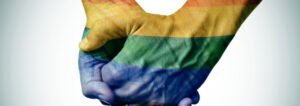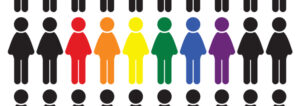Bring pride into your workforce
- 4 Min Read
When you consider that it’s 2018 and over 25% of gay, lesbian or bisexual employees in the UK do not feel confident enough at work to be openly who they are, it’s incredibly alarming. In addition, according to Stonewall, 42% of trans people are not living entirely as their preferred gender because they feel it could directly impact or threaten their job. How can we change these attitudes?
- Author: Emily Sexton-Brown
- Date published: May 9, 2018
- Categories

What are the challenges that members of the LGBTQ+ community face, and how can employers support and care for their entire workforce?
 Challenges within the community
Challenges within the community
Harassment in the workplace is classed by The Equality Act 2010 as “unwanted conduct which violates someone’s dignity or creates an intimidating, degrading, humiliating or offensive environment.” Levels of harassment and bullying can range from jokes, or ‘banter’, to insulting threats and degrading remarks made about an individual’s sexual orientation or perhaps how they choose to represent their own gender. Other forms of harassment could be classed as others asking uncomfortable or intrusive questions or ‘outing’ the individual.
Despite this, more than one in three members of the LGBTQ+ community have been either harassed or bullied within their place of work. According to the Trade Union Congress’s extensive workplace LGBT survey, which received over 5000 responses, two in five LGBT employees have been discriminated against by a colleague, and a further one in four by their manager.
The Equality Act states that employers should take responsibility for the behaviour of their employees and prevent any homophobia or discrimination from occurring.
Supportive and inclusive working environments
Not only must organisations abide by the law by stopping any form of discrimination – but it’s simply the right thing to do ethically. Not all businesses will feel confident supporting their LGBTQ+ workforce, but they can learn from those who are actively making their workforces truly inclusive. Accenture aims to be the world’s most inclusive organisation by 2020, ongoing work will Stonewall is ensuring they are headed in the right direction for true inclusivity. Some of the key findings from the paper both Accenture and Stonewall produced Engaging the majority to create an LGBT inclusive workplace were to ensure LGBTQ+ training is entirely all-encompassing, ensuring employees are equipped with both the knowledge and understanding. Another learning was to make sure LGBTQ+ messaging exists within the business-as-usual content, ensuring diversity is central to the organisation’s culture.
This year, The National Assembly for Wales topped Stonewall’s top 100 Employers 2018, which also included companies that have created workplaces where trans people can be themselves at work due to their continued commitment to diversity and inclusion.
IBM is another organisation that have continuously supported the LGBTQ+ community, in a personal blog from an IBM employee Tony Tenicela who cites why as an openly gay man he feels he can be entirely himself at work. Tony calls himself a ‘diversity and inclusion evangelist’ and details how across his 20 years at IBM they always encouraged him to be himself, something all organisations should be actioning every day.
It’s important for organisations and their business leaders to support and include all LGBTQ+ employees; this can be done in several ways. Including:
- Challenging the status quo and influencing society – educate other businesses and share your diversity and inclusion initiatives.
- Don’t be afraid to ask questions – you’re not expected to know everything.
- Ask employees how they’d like to be treated – the phrase ‘treat others how you’d like to be treated’ is always a good guide, it’s simplistic but highly appropriate when reaching out for ways to manage others.
- Consider changing your talent resourcing strategies, be mindful and encourage all people within society to join your organisation.
As an employer, question whether you have any diversity and inclusion evangelists or role models within your organisation. In many instances change comes from the top, and leaders who role model these values and attitudes will go a long way in influencing the entire company, much like a ripple effect.
Pride and Prejudice
On 24th May, The Economist will host the event Pride and Prejudice, which is a 24-hour worldwide event taking place in Hong-Kong, London and New York to celebrate and champion LGBTQ+ on a global scale.
Pride and Prejudice will be chaired by senior editors at The Economist which has always been a strong LGBTQ+ and change advocate. The day will platform key government policy and influential business decision-makers as well as pioneering thought leaders sharing insights into their LGBTQ+ business policies and agendas. Use the code HRD/DC to receive 20% off your ticket.
For more information, click here.
We have a special discount for you. Can you mention that they will l get 20% off with code HRD/DC? If it can be added to the last line that would be great!









